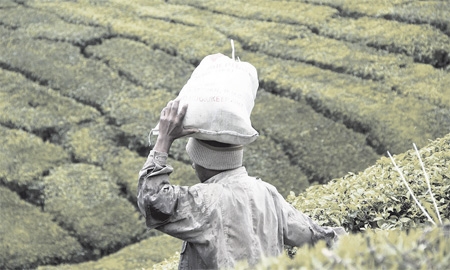Over the past 50 years, the plantations and commodities sector has been one of the key drivers of Malaysia’s economic growth. Comprising palm oil, rubber, timber, cocoa, pepper and tobacco, the sector has become one of the country’s major export earnings sources.
In 2010 export values of commodities and commodity-based products reached £23.5 billion as global demand for vegetable oils, rubber and cocoa butter overtook supply. The figure represents an increase of 24 per cent on the £18.87 billion brought in the year before and even surpassed the previous record of £23.28 billion in 2008.
“Big commodities we are producing right now are palm oil and rubber, as well as cocoa,” says Tan Sri Bernard Giluk Dompok, Minister of Plantation Industries and Commodities. “Palm oil was not indigenous to the country and now we have almost perfected the planting of it.”
The plantations and commodities sector naturally goes hand-in-hand with the Government’s sustainability and environmental protection efforts, as well as the drive to alleviate poverty and rural depopulation. “We are focused on the three P’s – people, planet, profit – and they must be linked. You must not look at things purely from a profit perspective: you must also look at the planet as well as the people,” says Mr Dompok.
To remain competitive against other commodities-producing countries, Malaysia will focus on venturing into diversified niche business activities, such as developing, enhancing and promoting the oleochemical and biomass downstream industries, especially for its palm oil.
The Minister says that the Government is actively looking at ways of improving productivity and that between 2009 and 2010, some £20.7 million was allocated to assist smallholders in replanting activities. “We are also going for timber plantations as well,” adds the Minister.
The
Malaysian Timber Industry Board (
MTIB) was established in 1973 as the lead agency to enhance the development of the Malaysian timber industry. “One of our main competitive advantages is the availability of raw materials: 95 per cent of our industry uses internally supplied raw materials,” says Prof Madya Dr Jalaluddin Harun, director general of the MTIB.
“Another competitive advantage is that Malaysia is very innovative. We are constantly looking for sources of raw materials – we are looking at plantation forests and also new sources like oil palms, which reach up to 30 feet high. We are investigating new plant sources, such as kenaf and bamboo, as well as looking at sustainable and recyclable materials.”
He adds, “We do not want to just produce timber or plywood, but we want to convert it into end-products like furniture and mouldings, for example. At the moment, 60 per cent of our exports are from primary products like plywood, and 40 per cent for value-added products like furniture. By 2020, we want to reverse this balance.”
Recognising the importance of its forestry sector, Malaysia has put in place a sustainable forestry regime – 56 per cent of its land area is proudly still under forest cover.
The Government has also developed the Malaysian Timber Certification Scheme (MTCS), which is operated by the independent
Malaysian Timber Certification Council (
MTCC), to meet the demand for certified timber products. Since its implementation, various authorities and organisations in a number of countries such as the UK, Netherlands, New Zealand, France, Denmark, Germany and Japan have recognised MTCS as providing assurance of either sustainable or legal timber products.
“In addition to the usual factors of price, quality and reliability, Malaysian timber products now have an additional strength: we can now supply significant volumes of certified timber,” says Chew Lye Teng, CEO of the MTCC. “Most countries in the surrounding region are still unable to do that.”
Malaysia has a rich pool of expertise in various areas of commodities development. The goal is to establish Malaysia as a future centre of excellence for the commodity sector and a major producer of higher value-added commodity-based products for global markets.

0 COMMENTS